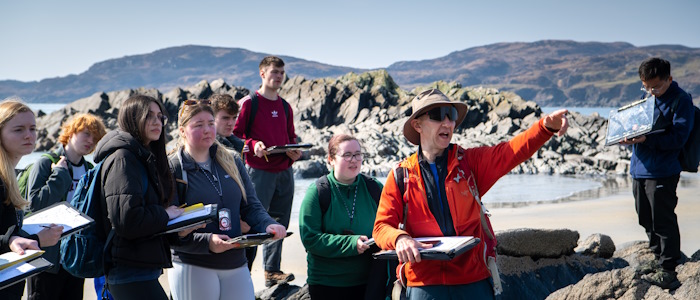Environmental Science MSc

The MSc in Environmental Science draws on expertise in the School of Social & Environmental Sustainability at the University of Glasgow. They represent a leading centre of expertise in environmental teaching and research. They work on issues dealing with the natural and urban environment including policies and practices for environmental management.
Programme structure
The MSc in Environmental Science aims to produce graduates who
- have a strong understanding of the environment and how it changes
- have an awareness of economic and policy issues affecting the environment
- are able to apply practical and technical solutions to assist in the management of the environment, environmental risk and environmental change.
You will develop a firm understanding of the environment – and how human and physical processes affect it.
You will be introduced to policies and practices for environmental science, as they are applied in a range of environments and at different scales. You will develop skills in processing and presenting environmental information to inform and enhance environmental management.
You will gain an enhanced appreciation of the importance of research and reflection as a route to successful environmental management.
Graduate attributes
This degree programme equips you for a wide range of opportunities by providing the knowledge and understanding to:
- Critically assess the influence of physical processes and the impact of human decision making on the environment
- Evaluate theories of environmental management
- Discuss theories of climate change, how this will affect different environments
- Compare and contrast environmental management policies in different regions and at different scales
- Develop strategies for behavioural change to improve management of the environment
- Explain the need to develop policies to manage the environment at different scales
- Create plans to react to and manage environmental change
- Explain how GIS and Remote Sensing contribute to the management of environmental data and can contribute to environmental management.
Courses
The programme is taken over 2 years of full-time study and is divided into 4 main components:
Part 1: Compulsory courses taught by University of Glasgow
- Principles of Geographic Information Systems for Environmental Science (20 credits)
- Environmental Remote Sensing (20 credits)
- Understanding Environmental Changes (20 credits)
- Environmental Policy (20 credits)
Part 2: Compulsory courses taught by Nankai University
- Applied Mathematics (20 credits)
- Environmental Economics (15 credits)
- Environmental Management
Part 3: Optional courses taught by Nankai University
At least 2 from:
- Environmental Planning and Strategic Environmental Assessment (15 credits)
- Cleaner Production (15 credits)
- Municipal Ecology (15 credits)
- Environmental Risk Assessment (15 credits)
- Advancement in Environmental Impact Assessment Techniques (15 credits)
Part 4: Compulsory Research Experience and Skills
- Social Science Research Methods
- Dissertation or Major Project on an approved topic in Environmental Science
Career prospects
Career opportunities include positions in international organisations, government ministries, academia and research institutions, non-governmental organisations; and further study at PhD level.
English language requirements
| TESTS |
SCORES |
|
IELTS(Academic) |
Overall score of 6.5, with no sub-test less than 6.0 in each band. |
|
TOEFL iBT
|
Overall score of 90
|
|
Sub-tests no less than: Reading 20 Listening 19 Speaking 19 Writing 23 |
How to apply
To apply as a student of Chinese Nationality:
- Students register online for the China National Postgraduate Entrance Examination and select their desired JGS MSc programme.
- Students sit the National Entrance Exam
- Once the results are released, students are selected for joint interviews by Nankai University and the University of Glasgow. Students must fulfil the requirements for both universities.
To apply as a student of non Chinese Nationality:
Please apply through the International Office of Nankai University, which can be contacted at:
Tel: +86 22 2350 8825
Email: studyinnankai@nankai.edu.cn
Session dates
- Autumn semester: 26/08/2024 - 10/01/2025
- Winter break: 13/01/2025 - 16/02/2025
- Spring semester:17/02/2025 - 27/06/2025
- Summer break: 30/06/2025 - 31/08/2025
Staff
Dr Xiaogang Shi - UoG Programme Convenor
 Dr Shi is a Senior Lecturer in Hydrology and Climate Change at the University of Glasgow. He is the Programme Director for MSc Environmental Science of the University of Glasgow-Nankai University Joint Graduate School, and the Research Lead of Environmental Sustainability in the Sustainability IRT leadership team of College of Social Sciences. Dr Shi is a hydrologist with research interests in understanding the changes in the terrestrial water cycle under global change driven by natural and human-induced forces, including climate change, land use/cover change, and human water use. His research work mainly focuses on climate extremes and water hazards (e.g. floods and droughts), hydrological modelling and forecasting, big-data and machine learning, groundwater and surface-water interactions, hydro-meteorological risk assessment, and water resources management in different regions worldwide by using remote sensing data, reanalysis products, and in situ observations, as well as model outputs.
Dr Shi is a Senior Lecturer in Hydrology and Climate Change at the University of Glasgow. He is the Programme Director for MSc Environmental Science of the University of Glasgow-Nankai University Joint Graduate School, and the Research Lead of Environmental Sustainability in the Sustainability IRT leadership team of College of Social Sciences. Dr Shi is a hydrologist with research interests in understanding the changes in the terrestrial water cycle under global change driven by natural and human-induced forces, including climate change, land use/cover change, and human water use. His research work mainly focuses on climate extremes and water hazards (e.g. floods and droughts), hydrological modelling and forecasting, big-data and machine learning, groundwater and surface-water interactions, hydro-meteorological risk assessment, and water resources management in different regions worldwide by using remote sensing data, reanalysis products, and in situ observations, as well as model outputs.
Key publications:
- Li, Z., Zhou, P., Shi, X. and Li, Y. (2021) Forest effects on runoff under climate change in the Upper Dongjiang River Basin: insights from annual to intra-annual scales. Environmental Research Letters, 16(1), 014032. (https://doi:10.1088/1748-9326/abd066)
- Zhang, D., Shi, X., Xu, H., Jing, Q., Pan, X., Liu, T., Wang, H. and Hou, H. (2020) A GIS-based spatial multi-index model for flood risk assessment in the Yangtze River Basin, China. Environmental Impact Assessment Review, 83, 106397. (https://doi:10.1016/j.eiar.2020.106397)
- Li, Z., Shi, X., Tang, Q., Zhang, Y., Gao, H., Pan, X., Déry, S. J. and Zhou, P. (2020) Partitioning the contributions of glacier melt and precipitation to the 1971–2010 runoff increases in a headwater basin of the Tarim River. Journal of Hydrology, 583, 124579. (https://doi:10.1016/j.jhydrol.2020.124579)
Professor Jing Wu – NKU Programme Convenor
 Prof. Jing Wu works at College of Environmental Science and Engineering, Nankai University. She serves as the Deputy Director of Environmental and Social Development Research Centre at Nankai University. She is a Registered Environmental Impact Assessment Engineer and holds the Law Occupation Qualification Certificate. Her research interests include environmental policy, environmental law, and environmental impact assessment, with specialty in evaluating the effectiveness of environmental policies and public participation, assessing the ecological and environmental damage, and appraising the potential of unconventional energy.
Prof. Jing Wu works at College of Environmental Science and Engineering, Nankai University. She serves as the Deputy Director of Environmental and Social Development Research Centre at Nankai University. She is a Registered Environmental Impact Assessment Engineer and holds the Law Occupation Qualification Certificate. Her research interests include environmental policy, environmental law, and environmental impact assessment, with specialty in evaluating the effectiveness of environmental policies and public participation, assessing the ecological and environmental damage, and appraising the potential of unconventional energy.
Key publications
- Jing Wu, I-Shin CHANG. Environmental Management in China-Policies and Institutions, Chemical Industry Press and Springer Nature Singapore Pte Ltd. 2020, ISBN 978-981-15-4893-2
- Jing Wu, I-Shin Chang, Qimanguli Yilihamu, Yu Zhou. Study on the Practice of Public Participation in Environmental Impact Assessment by Environmental Non-governmental Organizations in China. Renewable and Sustainable Energy Reviews. July 2017, 74 (2017) 186-200
- Shin Chang, Mengdie Zhao, Yilin Chen, Xiaomin Guo, Ying Zhu, Jing Wu, Tao Yuan, Evaluation on the integrated water resources management in China’s major cities -- Based on City Blueprint® Approach, Journal of Cleaner Production, Volume 262, July 2020, 121410, ISSN 0959-6526, https://doi.org/10.1016/j.jclepro.2020.121410.
Dr Brian Barrett - Environmental Remote Sensing
 Brian Barrett is a Senior Lecturer in Remote Sensing at the University of Glasgow’s School of Geographical & Earth Sciences in Glasgow’s West End. His research interests are in the use of remote sensing for monitoring, modelling and understanding environmental change across multiple spatial and temporal scales. He uses data acquired from in-situ, aerial and spaceborne sensors to deliver new insights into natural processes occurring in a range of environments, including grasslands, uplands, boreal and semi-arid regions. Research interests include: the assessment of grassland quality, quantity (biomass) and management (cutting, grazing) activities across different regions (e.g. Ireland, Colombia, and New Zealand) using dense time series of multispectral and extra-high-resolution spaceborne radar data; the use of remote sensing to study the interaction and further understanding of Earth system processes, in the context of environmental change; the use of different machine and deep learning approaches to identify patterns in time-series of multispectral and radar datasets with the goal of improving land use inventories; modelling land use and vegetation dynamics within the broader context of socio-ecological sustainability.
Brian Barrett is a Senior Lecturer in Remote Sensing at the University of Glasgow’s School of Geographical & Earth Sciences in Glasgow’s West End. His research interests are in the use of remote sensing for monitoring, modelling and understanding environmental change across multiple spatial and temporal scales. He uses data acquired from in-situ, aerial and spaceborne sensors to deliver new insights into natural processes occurring in a range of environments, including grasslands, uplands, boreal and semi-arid regions. Research interests include: the assessment of grassland quality, quantity (biomass) and management (cutting, grazing) activities across different regions (e.g. Ireland, Colombia, and New Zealand) using dense time series of multispectral and extra-high-resolution spaceborne radar data; the use of remote sensing to study the interaction and further understanding of Earth system processes, in the context of environmental change; the use of different machine and deep learning approaches to identify patterns in time-series of multispectral and radar datasets with the goal of improving land use inventories; modelling land use and vegetation dynamics within the broader context of socio-ecological sustainability.
Brian has a BSc (Honours) in Geomatics, MSc in GIS and Remote Sensing in Environmental Resource Management, and a PhD in remote sensing (Synthetic Aperture Radar (SAR) intensity and interferometric approaches to near-surface soil moisture characterisation). He has previously worked at the University of Edinburgh and University College Cork before joining the University of Glasgow in 2015.
Key publications
- Xu, J., Renaud, F. G. and Barrett, B. (2021) Modelling land system evolution and dynamics of terrestrial carbon stocks in the Luanhe River Basin, China: a scenario analysis of trade-offs and synergies between Sustainable Development Goals. Sustainability Science, (http://doi:10.1007/s11625-021-01004-y)
- Barrett, B., Raab, C., Cawkwell, F. and Green, S. (2016) Upland vegetation mapping using Random Forests with optical and radar satellite data. Remote Sensing in Ecology and Conservation, 2(4), pp. 212-231. (http://doi:10.1002/rse2.32)
- Barrett, B., Nitze, I., Green, S. and Cawkwell, F. (2014) Assessment of multi-temporal, multi-sensor radar and ancillary spatial data for grasslands monitoring in Ireland using machine learning approaches. Remote Sensing of Environment, 152, pp. 109-124. (http://doi:10.1016/j.rse.2014.05.018)
Professor Cecilia Tortajada – Environmental Policy
 Cecilia Tortajada is Professor in practice, School of Interdisciplinary Studies. With a Bachelor of Science degree on Biology at the National Autonomous University of Mexico; and Masters' degrees on Agricultural Sciences at Colegio de Postgraduados, Mexico and Kagawa University, Japan; Water Resources Management, Royal Institute of Technology, Stockholm, Sweden; and Law and Public Policy, University of Zaragoza, Spain.
Cecilia Tortajada is Professor in practice, School of Interdisciplinary Studies. With a Bachelor of Science degree on Biology at the National Autonomous University of Mexico; and Masters' degrees on Agricultural Sciences at Colegio de Postgraduados, Mexico and Kagawa University, Japan; Water Resources Management, Royal Institute of Technology, Stockholm, Sweden; and Law and Public Policy, University of Zaragoza, Spain.
Double doctorate on Philosophy and Technology, the Royal Institute of Technology (KTH), Stockholm, Sweden.
Key Publications:
Key Publications:
- Biswas, A., and Tortajada, C. (Eds.) (2022). Water security under climate change. Springer Nature, Singapore.
- Tortajada, C. (2020). Contributions of recycled wastewater to clean water and sanitation Sustainable Development Goals. npj Clean Water, 3, 22. (http://DOI:10.1038/s41545-020-0069-3 )
- Tortajada, C., and Zhang, H. (2021) When food meets BRI: China’s Emerging Food Silk Road. Global Food Security 100518. https://doi.org/10.1016/j.gfs.2021.100518
Tortajada, C., and Lim, N.S.W. (2021). Food Security and COVID-19: Impacts and Resilience in Singapore. Frontiers in Sustainable Food Systems. DOI: 10.3389/fsufs.2021.740780
Dr Natalie Welden - Research Methods
 Natalie Welden studied Ecology at Derby University (2005-2008), where she specialised in aquatic habitats and spending a summer canoeing up and down the River Trent sampling benthic invertebrates to determine the impacts of power station effluent. She then studied for an MSc in Marine Environmental Management at the University of York (2009-2010), focusing on anthropogenic impacts on estuarine environments. Over this period, she also worked at the Environment Agency, in the routine monitoring of river health, continuing her work on freshwater invertebrates, this time as indicators of riverine pollution.
Natalie Welden studied Ecology at Derby University (2005-2008), where she specialised in aquatic habitats and spending a summer canoeing up and down the River Trent sampling benthic invertebrates to determine the impacts of power station effluent. She then studied for an MSc in Marine Environmental Management at the University of York (2009-2010), focusing on anthropogenic impacts on estuarine environments. Over this period, she also worked at the Environment Agency, in the routine monitoring of river health, continuing her work on freshwater invertebrates, this time as indicators of riverine pollution.
Natalie did a PhD with the University of Glasgow (based at the University Marine Biological Station Millport), analysing the impacts of microplastic in the Clyde Sea Area (2011-2015). Natalie has undertaken post-doc studies at the Stockholm Environment Institute in York and at the Open University in Milton Keynes, before joining the University of Portsmouth as a Teaching Fellow in September 2017, where she was heavily involved in teaching both Marine Biology and Biology. Natalie returned to the University of Glasgow in August 2018, joining the School of Interdisciplinary Studies as a lecturer on the BSc in Environmental Science and Sustainability degree.
Key Publications:
- Welden, N. A. (2020) The environmental impacts of plastic pollution. In: Letcher, T. M. (ed.) Plastic Waste and Recycling: Environmental Impact, Societal Issues, Prevention, and Solutions. Academic Press: London, pp. 195-222. ISBN 9780128178805 (http://doi:10.1016/B978-0-12-817880-5.00008-6)
- Welden, N. A. and Lusher, A. (2020) Microplastics: from origin to impacts. In: Letcher, T. M. (ed.) Plastic Waste and Recycling: Environmental Impact, Societal Issues, Prevention, and Solutions. Academic Press: London, pp. 223-249. ISBN 9780128178805 (http://doi:10.1016/B978-0-12-817880-5.00009-8)
- Welden, N. (2019) Microplastics: emerging contaminants requiring multilevel management. In: Letcher, T. M. and Vallero, D. A. (eds.) Waste: a Handbook for Management [Second Edition]. Academic Press: Amsterdam, pp. 405-424. ISBN 9780128150603 (http://doi:10.1016/B978-0-12-815060-3.00021-9)
Dr. Jiren Xu – Understanding Environmental Changes
Dr Jiren Xu joined the University of Glasgow as a Lecturer in Remote Sensing & GIS in April 2023. Prior to joining the University of Glasgow, he worked as a Research Fellow at the University of Leeds and as a Research Associate at the University of Glasgow after he graduated with his PhD in Physical Geography at the University of Leeds in 2019.
As an environmental scientist with an interdisciplinary background, Dr Xu has developed expertise in applying GIS, remote sensing and process-based modelling in ecosystem services, nature-based solutions to climate change adaptation and mitigation, and sustainable development studies. The results of his interdisciplinary research are reflected in more than 30 publications (incl. 1 paper in Nature Sustainability and 2 papers in Nature Climate Change). Dr Xu’s research has been identified as two top 1% ESI Highly Cited Papers, featured in the media (e.g. The Times), and quoted in governmental policies (e.g. England Peatland Action Plan). Since 2019, Dr Xu has worked on two EU Horizon 2020-funded projects (WaterLANDS; OPERANDUM), three UKRI-funded projects (Social and environmental impacts of Covid-19 pandemic in Vietnamese provinces bordering China and Laos following border closure; River basins as ‘living laboratories’ for achieving sustainable development goals across national and sub-national scales; Discipline Hopping interdisciplinary peatland project) and two internal projects (Sustainable development of Asia’s deltas; Nature-based solution for reducing flood risk and achieving net-zero in the River Nith Catchment). Dr Xu collaborated broadly with national and international stakeholders and cross-disciplinary researchers throughout his research and knowledge exchange activities.”
Key publications:
- Xu, J., Barrett, B. and Renaud, F. G. (2022) Ecosystem services and disservices in the Luanhe River Basin in China under past, current and future land uses: implications for the Sustainable Development Goals. Sustainability Science, 17(4), pp. 1347-1364. (doi: 10.1007/s11625-021-01078-8)
- Berrang-Ford, L., [et al., including Xu, J.]. (2021) A systematic global stocktake of evidence on human adaptation to climate change. Nature Climate Change, 11: 989-1000 (doi: 10.1038/s41558-021-01170-y) (Cover Story)
- Xu, J., Morris, P. J., Liu, J. and Holden, J. (2018) Hotspots of peatland-derived potable water use identified by global analysis. Nature Sustainability, 1(5), pp. 246-253. (doi: 10.1038/s41893-018-0064-6)
Dr. Michelle Bloor – Dissertation Supervisor
 Michelle Bloor is a Senior Lecturer at the School of Interdisciplinary Studies, University of Glasgow and a senior editor of the Sustainable Environment journal. She is passionate about science communication and the transfer of science to regulation. Michelle is an academic representative at SETAC's European Food Safety Authority (EFSA) Sounding Board and SETAC's European Commission (EC) High Level Round Table for the Chemicals Strategy for Sustainability Sounding Board, and a Sherpa at the EC High Level Round Table for the Chemicals Strategy for Sustainability. She has a PhD in Environmental Engineering and her research interests are in the areas of chemical policy, aquatic ecotoxicology, pollution and pollution remediation, climate change and sustainability. Michelle is President of the Society of Environmental Toxicology and Chemistry (SETAC) Europe, a SETAC World Council Member and President of SETAC U.K. She is also a toxicity expert for the UK Science Media Centre.
Michelle Bloor is a Senior Lecturer at the School of Interdisciplinary Studies, University of Glasgow and a senior editor of the Sustainable Environment journal. She is passionate about science communication and the transfer of science to regulation. Michelle is an academic representative at SETAC's European Food Safety Authority (EFSA) Sounding Board and SETAC's European Commission (EC) High Level Round Table for the Chemicals Strategy for Sustainability Sounding Board, and a Sherpa at the EC High Level Round Table for the Chemicals Strategy for Sustainability. She has a PhD in Environmental Engineering and her research interests are in the areas of chemical policy, aquatic ecotoxicology, pollution and pollution remediation, climate change and sustainability. Michelle is President of the Society of Environmental Toxicology and Chemistry (SETAC) Europe, a SETAC World Council Member and President of SETAC U.K. She is also a toxicity expert for the UK Science Media Centre.
Key Publications:
- van Dijk, J., Leopold, A., Flerlage, H., van Wezel, A., Seiler, T.‐B., Enrici, M.‐H. and Bloor, M. C. (2021) The EU Green Deal's ambition for a toxic-free environment: filling the gap for science-based policymaking in integrated environmental assessment and management. Integrated Environmental Assessment and Management, (http://doi:10.1002/ieam.4429)
- Kiryushina, A., Kydralieva, K., Bondarenko, L., Posdnyakov, L., Manucharova, N., Bloor, M. C. and Terekhova, V. Divergent effects of antibiotics on plants and microbiota in soils with contrasting humus content. Water, Air, and Soil Pollution, (Accepted for Publication September 2021).
- Sizmur, T., Leharne, S., Bloor, M.C., #EnvChem2020: Chemistry of the Whole Environment Research. Environmental Toxicology and Chemistry. (Accepted for publication October 2021).
Dr. Stuart Hanscomb – Dissertation Supervisor
 Stuart took his degree in philosophy and psychology at Hull University, and wrote his Ph.D. on Existentialism at Durham University. He has lectured in the Philosophy Department at Durham, and taught both philosophy and psychology at a number of other institutions, including City University (London), The City Lit. (London), Birkbeck College (London), Stirling University, and Edinburgh University.
Stuart took his degree in philosophy and psychology at Hull University, and wrote his Ph.D. on Existentialism at Durham University. He has lectured in the Philosophy Department at Durham, and taught both philosophy and psychology at a number of other institutions, including City University (London), The City Lit. (London), Birkbeck College (London), Stirling University, and Edinburgh University.
He has been a lecturer at Glasgow University’s School of Interdisciplinary Studies since 2003, teaching philosophy and communication, and has published articles and books on, among other things, environmental ethics and behavioural change, and critical thinking.
Between 2002 and 2006 he worked as a consultant for the marketing company Mountainview (London), writing and delivering material on the self, emotion and the psychology of persuasion.
https://www.gla.ac.uk/schools/interdisciplinary/staff/stuarthanscomb/
Dr. Benjamin Franks – Dissertation Supervisor
 Benjamin Franks received his PhD from the Post-graduate School of Critical Theory; University of Nottingham having gained an M.Phil and BA in Philosophy from the University of Manchester. He has been a lecturer at Glasgow University’s School of Interdisciplinary Studies since 2001, teaching social philosophy, ethics and political theory, and has published articles and books on, among other things, environmental ethics and behavioural change, applied ethics especially in relation to political action and political ideologies.
Benjamin Franks received his PhD from the Post-graduate School of Critical Theory; University of Nottingham having gained an M.Phil and BA in Philosophy from the University of Manchester. He has been a lecturer at Glasgow University’s School of Interdisciplinary Studies since 2001, teaching social philosophy, ethics and political theory, and has published articles and books on, among other things, environmental ethics and behavioural change, applied ethics especially in relation to political action and political ideologies.
Key Publications:
- Franks, Benjamin (2020), Anarchisms, Postanarchisms and Ethics (Rowman and Littlefield)
- Franks, Benjamin, Jun, Nathan and Williams, Leonard eds. (2018), Anarchisms: A conceptual approach (Routledge)
- Franks, Benjamin, Hanscomb, Stuart and Johnston, Sean (2017), Environmental Ethics and Behavioural Change (Routledge).
Dr. Steven Gillespie – Dissertation Supervisor
 Steven holds a BSc (Hons) in Environmental Management, MSc in Environmental Science and PhD in Sustainable Rural Development.
Steven holds a BSc (Hons) in Environmental Management, MSc in Environmental Science and PhD in Sustainable Rural Development.
Steven is currently Programme Director of the BSc Environmental Science and Sustainability degree and contributes to several MSc programmes.
Key Publications:
- Dunk, R. M., Gillespie, S. A. and MacLeod, D. (2016) Participation and retention in a green tourism certification scheme. Journal of Sustainable Tourism, 24(12), pp. 1585-1603. (doi: 10.1080/09669582.2015.1134558)
- Bold, V. and Gillespie, S. (2009) The Southern Upland Way: exploring landscape and culture. International Journal of Heritage Studies, 15(2-3), pp. 245-257. (doi: 10.1080/13527250902890944)
Dr. MD Sarwar Sohel – Dissertation Supervisor
 Sarwar Sohel is a Lecturer in Environmental Science & Sustainability at the University of Glasgow's School of Interdisciplinary Studies. He is currently Programme Director of the MSc Environmental Risk Management.
Sarwar Sohel is a Lecturer in Environmental Science & Sustainability at the University of Glasgow's School of Interdisciplinary Studies. He is currently Programme Director of the MSc Environmental Risk Management.
Sarwar holds a PhD (2016) in Geography and Environmental Science from the University of Southampton, UK, where he specialized in interdisciplinary and social-ecological systems research. Prior to starting my PhD, he completed his MSc (2012) in Environmental Sciences from Wageningen University, The Netherlands.
Thematically, his research interest spans to ecosystem services, and human wellbeing, resilience to natural hazards, climate change impacts and adaptation, water resource management, sustainable land management, Sustainable Development Goals (SDGs), poverty, and food security.
On the methodological side, he uses system dynamics, agent-based and participatory modelling to understand the dynamics of the social-ecological systems. In addition to the modelling approaches, he also uses time series analysis through statistical and econometric methods to understand the co-evolution and relationships within and between social and ecological systems. In the case of cross-sectional analysis, he is skilled at analysing the “Household Income and Expenditure Survey” datasets collected by national governments and the world bank.
Key Publications:
- Kabir, A., Amin, M. N., Roy, K. and Hossain, M. S. (2021) Determinants of climate change adaptation strategies in the coastal zone of Bangladesh: implications for adaptation to climate change in developing countries. Mitigation and Adaptation Strategies for Global Change, 26(7), 30. (http://doi:10.1007/s11027-021-09968-z)
- Basak, S. M., Hossain, M. S., Tusznio, J. and Grodzińska-Jurczak, M. (2021) Social benefits of river restoration from ecosystem services perspective: a systematic review. Environmental Science and Policy, 124, pp. 90-100. (http://doi:10.1016/j.envsci.2021.06.005)
- Hossain, M. S., Ramirez, J. A., Haisch, T., Speranza, C. I., Martius, O., Meyer, H. and Keiler, M. (2020) A coupled human and landscape conceptual model of risk and resilience in Swiss Alpine communities. Science of the Total Environment, 730, 138322. (http://doi: 10.1016/j.scitotenv.2020.138322 (PMID:32408086)
Dr. Bethan Wood – Dissertation Supervisor
https://www.gla.ac.uk/schools/interdisciplinary/staff/bethanwood/
Dr Wood’s supervision interests include: ecology; biodiversity; and conservation.
Professor Fabrice Renaud – Head of School
 Fabrice Renaud is Professor of Environmental Risk and Community Resilience at the University of Glasgow's School of Interdisciplinary Studies in Dumfries, which he joined in February 2018. His main area of research is on the role ecosystems play in disaster risk reduction and climate change adaptation. He was the University of Glasgow convener of the MSc in Environmental Science from 2018 to 2021.
Fabrice Renaud is Professor of Environmental Risk and Community Resilience at the University of Glasgow's School of Interdisciplinary Studies in Dumfries, which he joined in February 2018. His main area of research is on the role ecosystems play in disaster risk reduction and climate change adaptation. He was the University of Glasgow convener of the MSc in Environmental Science from 2018 to 2021.
Before joining the University of Glasgow, Fabrice worked for 13 years at the United Nations University Institute for Environment and Human Security (UNU-EHS) in Bonn, Germany (11 years) and Jakarta, Indonesia (2 years). For over a decade, he was head of the Environmental Vulnerability and Ecosystem Services section of UNU-EHS implementing research focussing on two major themes: the environmental dimension of vulnerability and risk, particularly in coastal and deltaic environments, and the links between human activities, water pollution, and the risks these pose to ecosystems and human health. His research projects were principally in Europe, Central, South and Southeast Asia, and in Western Africa. For a period of two years (2009-2011) he was Director ad interim of the UNU-EHS.
After completing his PhD and before joining the UN system he was a Research Officer at Cranfield University’s Centre for EcoChemistry in the UK where his research centred on the development, coding and parameterisation of various pesticide fate models, as well as carrying out laboratory and lysimeter experiments to study the interaction between pesticides and soils.
Fabrice holds a PhD degree (2000) in Crop, Soil, and Environmental Sciences from the University of Arkansas (Fayetteville, USA) where he specialised in soil physics. Between his MSc and PhD degrees, Fabrice worked in Namibia on a rural development project and at the International Board for Soil Research and Management in Thailand on soil erosion problems in the north of the country.
Key publications:
- Sudmeier-Rieux K., Arce-Mojica T., Boehmer H.J., Doswald N., Emerton L., Friess D.A., Galvin S., Hagenlocher M., James H., Laban P., Lacambra C., Lange W., McAdoo B.G., Moos C., Mysiak J., Narvaez L., Nehren U., Peduzzi P., Renaud F.G., Sandholz S., Schreyers L., Sebesvari Z., Tom T., Triyanti A., van Eijk P., van Staveren M., Vicarelli M. and Walz Y. (2021): Scientific evidence for ecosystem-based disaster risk reduction. Nature Sustainability 4:803-810. (https://doi.org/10.1038/s41893-021-00732-4)
- Shah M.A.R., Renaud F.G., Anderson C.C., Wild A., Domeneghetti A., Polderman A., Votsis A., Pulvirenti B., Basu B., Thomson C., Panga D., Pouta E., Toth E., Pilla F., Sahani J., Ommer J., El Zohbik J., Munro K., Stefanopoulou M., Loupis M., Pangas N., Kumar P., Debele S., Preuschmann S., Zixuann W. (2020): A review of hydro-meteorological hazard, vulnerability, and risk assessment frameworks and indicators in the context of nature-based solutions. International Journal for Disaster Risk Reduction 50:101728. (https://doi.org/10.1016/j.ijdrr.2020.101728).
- Hagenlocher M., Renaud F.G., Haas S., Sebesvari Z. (2018): Vulnerability and risk of deltaic social-ecological systems exposed to multiple hazards. Science of the Total Environment 631-632:71-80. (https://doi.org/10.1016/j.scitotenv.2018.03.013)
Professor He Xu – Environmental Management
 He Xu’s research focus is on strategic environmental assessment, environmental planning, the circular economy and global climate change. Since 1997 he has contributed to various research projects, including research supported by CIDA (the Canadian International Development Agency), IGES (the Institute for Global Environmental Strategies), the World Bank, and the Asian Development Bank, among others.
He Xu’s research focus is on strategic environmental assessment, environmental planning, the circular economy and global climate change. Since 1997 he has contributed to various research projects, including research supported by CIDA (the Canadian International Development Agency), IGES (the Institute for Global Environmental Strategies), the World Bank, and the Asian Development Bank, among others.
He has been a Visiting Scholar to the School of Management at the Royal Holloway, University of London, to the Department of Civil Design at the University of Liverpool, and to the Institute of Environmental Studies’ Graduate School of Frontier Sciences at the University of Tokyo. He was a postdoctoral Fellow at the United Nations University – Institute of Advanced Studies. He gained his BSc, his MSc and his PhD from the College of Environmental Science and Engineering at Nankai University.
He has been on the staff of Nankai University since 2001 and holds the position of Professor of the College of Environmental Science and Engineering at the University. He is also Vice-Director of the Research Centre for Strategic Environmental Assessment, the Nankai National Centre for Innovation Research on Circular Economy, and the TEDA Circular Economy Promotion Centre.
Key publications
- Bai Hongtao*, Zhang Yingxuan, Wang Huizhi, Xu He*. (2014). A hybrid method for provincial scale energy-related carbon emission allocation in China, Environmental Science & Technology. Vol. 48, 2541-2550. (IF=5.257)
- Huizhi Wang, HongtaoBai*, Jia Liu, He Xu*. (2012). Measurement indicators and an evaluation approach for assessing Strategic Environmental Assessment effectiveness. Ecological indicators. Vol. 23: 413-420. (IF=2.967)
- HongtaoBai, Huizhi Wang, He Xu*. (2010). Quantitative evaluation of air pollution in transport strategic environmental assessment: a case study based on uncertainty analysis and GIS technology. Journal of Zhejiang University Science A. Vol. 11(5). 370-381. (IF=0.527)
Professor Lin Zhu – Ecotoxicology and Environmental Risk
 Lin Zhu is Professor of the College of Environmental Science and engineering at Nankai University. He did his undergraduate degree in Marine Biology at the Shandong Oceanography College and received both his MSc degree in Marine Ecology and his PhD in Ecotoxicology from the Free University of Brussels (Vrije Universiteit Brussel) (VUB), in Belgium.
Lin Zhu is Professor of the College of Environmental Science and engineering at Nankai University. He did his undergraduate degree in Marine Biology at the Shandong Oceanography College and received both his MSc degree in Marine Ecology and his PhD in Ecotoxicology from the Free University of Brussels (Vrije Universiteit Brussel) (VUB), in Belgium.
His research interests focus on ecotoxicology, marine ecology and ecological assessment. He was the secretary-general of the Tianjin Society of Ecology from 1996-2001 and a member of the European Society for Comparative Physiology and Biochemistry from 1990-96. He was an assistant engineer in the Institute of Marine Environmental Protection in Dalian, China, before joining the staff of Nankai University.
His research has ranged from studying the effects of crude oil and dispersant on marine phytoplankton to the feeding behaviour of Copepods (small seawater crustaceans) in West European estuaries, and researching the security of drinking water in northern China and using PCR (polymerase chain reaction) technolocy to detect pathogenic microbes in seawater.
Recent publications
- Xiaoshan Zhu, Lin Zhu. Comparative toxicity of several metal oxide nanoparticle aqueous suspensions to Zebrafish (Danio rerio) early developmental stage. Journal of Environmental Science and Health Part A - Toxic/Hazardous Substances & Environmental Engineering, 43 (3): 278-284 Jan 2008.
- Duan Zhenghua, Zhu Lin, Yao Kun, et al. Single and joint toxic effects of pentachlorophenol and bisphenol A on the development of zebrafish (Brachydanio rerio) embryo. Ecotoxicology and Environmental Safety,71, 774-780, Mar 2008
- Zhongzhi Chen, Lin Zhu, Kevin J. Wilkinson. Validation of the Biotic Ligand Model in Metal Mixtures: Bioaccumulation of Lead and Copper. Environ. Sci. Technol. 2010, 44, 3580–3586
Dr JunFeng Wang – Environmental Economics
 JunFeng Wang received his PhD in Environmental Science from Nankai University in 2006. His major research interests are: Caluation of natural resources; sustainable development; renewable resource management and conservation; methods of implementing efficient environmental policies; case studies of economic-ecologic conflict or harmony; and material flow analysis (MFA).
JunFeng Wang received his PhD in Environmental Science from Nankai University in 2006. His major research interests are: Caluation of natural resources; sustainable development; renewable resource management and conservation; methods of implementing efficient environmental policies; case studies of economic-ecologic conflict or harmony; and material flow analysis (MFA).
Key publications
- Junfeng Wang, Jingwen-zhang, Xinliu. (2013). The study of allowance prices association mechanism on carbon emissions trading market-based on econometric model association analysis, China population, resources and environment, vol.23(12).
- Junfeng Wang, Caobo Hou, (2013). Study on Implementation Framework and Compensation Pattern of Basin Ecological Compensation Mechanism in China: From the Perspective of Compensation Funds Source,China population, resources and environment, vol.23(2).
- Junfeng Wang, Yong Yan. (2012). Research on Regional Difference's Impact on Pollution Charge and Tax in China, China population, resources and environment, vol.22(3).
Dr Chunli Chu – Theories and Principles of Sustainability
 Awarded his PhD in 2011 from Nankai, Chunli Chu is a Unversity Lecturer in the College of Environmental Science and Engineering.
Awarded his PhD in 2011 from Nankai, Chunli Chu is a Unversity Lecturer in the College of Environmental Science and Engineering.
His research is focused on industrial ecology, environmental planning and management, and the reuse of resources.
He currently teaches three courses at undergraduate level: Basement of Environmental Science; Industrial Ecology; and Pollution events.
Key publications
- Chu Chunli,Ju Meiting,Yu Jinglei Yu,et al..(2010). Analysis of resource productivity in Binhai New Area of Tianjin city.MASS 2010:2010 International Conference on management and service science.24-26.
- Chunli Chu, Meiting Ju and Wei Liu. (2010). Analysis of sustainability and advice on Eco-city of Binhai New Area of Tianjin city. ICECS 2010: 2010 3rd international conference on environmental and computer science. Vol.176.17-19
- Ju, Mei-ting; Chu Chunli; et al, (2010). Industrial ecology and innovation space , Chemical Engineering Press.
Dr Chunyan Shan – Theories and Principles of Sustainability
 Chunyan Shan is an Associate Professor in the Department of Environmental Science in Nankai University;s College of Environmental Science. Her particular research interests are atmospheric particulates pollution control, transportation planning, regional environment planning, and environmental management.
Chunyan Shan is an Associate Professor in the Department of Environmental Science in Nankai University;s College of Environmental Science. Her particular research interests are atmospheric particulates pollution control, transportation planning, regional environment planning, and environmental management.
She did both her BSc in Environmental Science and her MSc in Environmental Planning at Northeast Normal University in Changchun in China; she was awarded her D.Eng in Transportation Planning from the Tokyo Institute of Technology in 2008. In 2012 she was a visiting researcher at the Tokyo Institute of Technology and in 2002 she was a visiting researcher at McGill University in Montreal, Quebec.
In 2001 she was named an “Excellent Teacher of Nankai University”.
Key publications
- Yanwen Qiang & Chunyan Shan. (2013). Vehicular Emission Models of Particulate Matter and Their Application in China, Journal of Nankai University (Natural Science), Vol. 46(6):41-47.
- Chunyan Shan and Tetsuo Yai. (2011), Public Involvement Requirements for Infrastructure Planning in China, Habitat International Vol. 35(1): 158-166
Mark Firth - Programme Administrator
Mark works in the School Office at the University of Glasgow School of Interdisciplinary Studies in Dumfries. He provides administrative support for the MSc Environmental Science, as well as supporting Dumfries-based staff and students.

